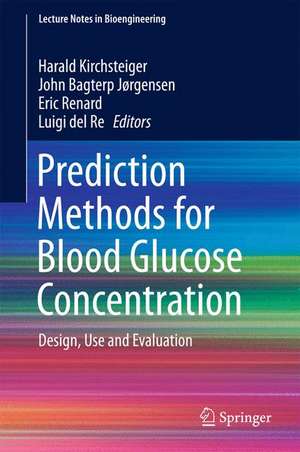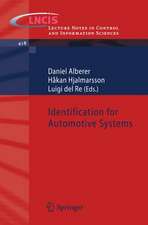Prediction Methods for Blood Glucose Concentration: Design, Use and Evaluation: Lecture Notes in Bioengineering
Editat de Harald Kirchsteiger, John Bagterp Jørgensen, Eric Renard, Luigi del Reen Limba Engleză Hardback – 25 noi 2015
The authors address the topic of blood-glucose prediction from medical, scientific and technological points of view. Simulation studies are utilized for complementary analysis but the primary focus of this book is on real applications, using clinical data from diabetic subjects.
The text details the current state of the art by surveying prediction algorithms, and then moves beyond it with the most recent advancesin data-based modeling of glucose metabolism. The topic of performance evaluation is discussed and the relationship of clinical and technological needs and goals examined with regard to their implications for medical devices employing prediction algorithms. Practical and theoretical questions associated with such devices and their solutions are highlighted.
This book shows researchers interested in biomedical device technology and control researchers working with predictive algorithms how incorporation of predictive algorithms into the next generation of portable glucose measurement can make treatment of diabetes safer and more efficient.
| Toate formatele și edițiile | Preț | Express |
|---|---|---|
| Paperback (1) | 714.83 lei 6-8 săpt. | |
| Springer International Publishing – 23 aug 2016 | 714.83 lei 6-8 săpt. | |
| Hardback (1) | 721.77 lei 6-8 săpt. | |
| Springer International Publishing – 25 noi 2015 | 721.77 lei 6-8 săpt. |
Din seria Lecture Notes in Bioengineering
- 5%
 Preț: 1423.12 lei
Preț: 1423.12 lei - 5%
 Preț: 2113.39 lei
Preț: 2113.39 lei - 5%
 Preț: 1037.21 lei
Preț: 1037.21 lei - 5%
 Preț: 870.79 lei
Preț: 870.79 lei - 5%
 Preț: 719.02 lei
Preț: 719.02 lei - 5%
 Preț: 1086.75 lei
Preț: 1086.75 lei - 5%
 Preț: 1171.32 lei
Preț: 1171.32 lei - 18%
 Preț: 1227.36 lei
Preț: 1227.36 lei - 5%
 Preț: 1156.44 lei
Preț: 1156.44 lei - 5%
 Preț: 1419.03 lei
Preț: 1419.03 lei - 18%
 Preț: 1001.19 lei
Preț: 1001.19 lei - 5%
 Preț: 1099.94 lei
Preț: 1099.94 lei - 5%
 Preț: 1172.17 lei
Preț: 1172.17 lei - 5%
 Preț: 1423.79 lei
Preț: 1423.79 lei - 5%
 Preț: 907.71 lei
Preț: 907.71 lei - 5%
 Preț: 1089.12 lei
Preț: 1089.12 lei - 5%
 Preț: 1297.78 lei
Preț: 1297.78 lei - 5%
 Preț: 1618.34 lei
Preț: 1618.34 lei - 5%
 Preț: 710.43 lei
Preț: 710.43 lei - 5%
 Preț: 584.78 lei
Preț: 584.78 lei - 15%
 Preț: 651.34 lei
Preț: 651.34 lei - 5%
 Preț: 719.02 lei
Preț: 719.02 lei - 5%
 Preț: 1427.07 lei
Preț: 1427.07 lei - 5%
 Preț: 1417.54 lei
Preț: 1417.54 lei - 5%
 Preț: 716.84 lei
Preț: 716.84 lei - 5%
 Preț: 1093.52 lei
Preț: 1093.52 lei - 5%
 Preț: 1106.69 lei
Preț: 1106.69 lei - 18%
 Preț: 782.42 lei
Preț: 782.42 lei - 18%
 Preț: 1226.90 lei
Preț: 1226.90 lei - 5%
 Preț: 1280.76 lei
Preț: 1280.76 lei - 5%
 Preț: 1108.35 lei
Preț: 1108.35 lei - 18%
 Preț: 1380.78 lei
Preț: 1380.78 lei - 5%
 Preț: 1286.97 lei
Preț: 1286.97 lei - 15%
 Preț: 644.95 lei
Preț: 644.95 lei
Preț: 721.77 lei
Preț vechi: 759.76 lei
-5% Nou
Puncte Express: 1083
Preț estimativ în valută:
138.11€ • 143.92$ • 114.36£
138.11€ • 143.92$ • 114.36£
Carte tipărită la comandă
Livrare economică 03-17 aprilie
Preluare comenzi: 021 569.72.76
Specificații
ISBN-13: 9783319259116
ISBN-10: 3319259113
Pagini: 250
Ilustrații: XIV, 265 p. 93 illus., 72 illus. in color.
Dimensiuni: 155 x 235 x 18 mm
Greutate: 0.57 kg
Ediția:1st ed. 2016
Editura: Springer International Publishing
Colecția Springer
Seria Lecture Notes in Bioengineering
Locul publicării:Cham, Switzerland
ISBN-10: 3319259113
Pagini: 250
Ilustrații: XIV, 265 p. 93 illus., 72 illus. in color.
Dimensiuni: 155 x 235 x 18 mm
Greutate: 0.57 kg
Ediția:1st ed. 2016
Editura: Springer International Publishing
Colecția Springer
Seria Lecture Notes in Bioengineering
Locul publicării:Cham, Switzerland
Public țintă
ResearchCuprins
From the Contents : Part I Introduction.- Clinical Relevance of Glucose Prediction: Needs and Goals.- What is the Technical Challenge of Blood Glucose Prediction?.- Part II Possible Solutions.- An Overview of Glucose Prediction Algorithms.- Data-Based Interval Models Employing Continuous-Time System Identification.
Notă biografică
Harald Kirchsteiger is postdoctoral researcher at the Johannes Kepler University in Linz, Austria. He finished his PhD on model-based control of blood glucose concentration in 2012 and continued working intensively on data-based modeling of the glucose/insulin metabolism.
John Bagterp Jørgensen is an associate professor in Scientific Computing at Department of Applied Mathematics and Computer Science at the Technical University of Denmark. He is also a faculty member at the Technical University of Denmark’s Center for Energy Resources Engineering (CERE). His research focus is concentrated on Model Predictive Control including computational aspects and applications. The applications include industrial processes, intelligent control of smart energy systems, production optimization and closed-loop reservoir management of oil fields, and an artificial pancreas for people with type 1 diabetes. His research is to a large extent conducted in collaboration with industrial companies.
Eric Renard is professor of endocrinology, diabetes and metabolic diseases at the University of Montpellier I, France. He is also head of the Department of Endocrinology, Diabetes, Nutrition and the Clinical Investigation Center INSERM 1411 at Montpellier University Hospital. Since more than 20 years, his research group has been at the forefront of the transfer of technologies toward diabetes management, including wearable and implantable insulin pumps, continuous glucose monitoring and artificial pancreas models.
Luigi del Re is professor at the Johannes Kepler University in Linz, Austria, in the field of modeling and control of dynamical systems with special interest in complex nonlinear systems both from the control and the optimization point of view. He has been working in biomedical applications since 1992.
John Bagterp Jørgensen is an associate professor in Scientific Computing at Department of Applied Mathematics and Computer Science at the Technical University of Denmark. He is also a faculty member at the Technical University of Denmark’s Center for Energy Resources Engineering (CERE). His research focus is concentrated on Model Predictive Control including computational aspects and applications. The applications include industrial processes, intelligent control of smart energy systems, production optimization and closed-loop reservoir management of oil fields, and an artificial pancreas for people with type 1 diabetes. His research is to a large extent conducted in collaboration with industrial companies.
Eric Renard is professor of endocrinology, diabetes and metabolic diseases at the University of Montpellier I, France. He is also head of the Department of Endocrinology, Diabetes, Nutrition and the Clinical Investigation Center INSERM 1411 at Montpellier University Hospital. Since more than 20 years, his research group has been at the forefront of the transfer of technologies toward diabetes management, including wearable and implantable insulin pumps, continuous glucose monitoring and artificial pancreas models.
Luigi del Re is professor at the Johannes Kepler University in Linz, Austria, in the field of modeling and control of dynamical systems with special interest in complex nonlinear systems both from the control and the optimization point of view. He has been working in biomedical applications since 1992.
Textul de pe ultima copertă
This book tackles the problem of overshoot and undershoot in blood glucose levels caused by delay in the effects of carbohydrate consumption and insulin administration. The ideas presented here will be very important in maintaining the welfare of insulin-dependent diabetics and avoiding the damaging effects of unpredicted swings in blood glucose – accurate prediction enables the implementation of counter-measures. The glucose prediction algorithms described are also a key and critical ingredient of automated insulin delivery systems, the so-called “artificial pancreas”.
The authors address the topic of blood-glucose prediction from medical, scientific and technological points of view. Simulation studies are utilized for complementary analysis but the primary focus of this book is on real applications, using clinical data from diabetic subjects.
The text details the current state of the art by surveying prediction algorithms, and then moves beyond it with the most recent advancesin data-based modeling of glucose metabolism. The topic of performance evaluation is discussed and the relationship of clinical and technological needs and goals examined with regard to their implications for medical devices employing prediction algorithms. Practical and theoretical questions associated with such devices and their solutions are highlighted.
This book shows researchers interested in biomedical device technology and control researchers working with predictive algorithms how incorporation of predictive algorithms into the next generation of portable glucose measurement can make treatment of diabetes safer and more efficient.
The authors address the topic of blood-glucose prediction from medical, scientific and technological points of view. Simulation studies are utilized for complementary analysis but the primary focus of this book is on real applications, using clinical data from diabetic subjects.
The text details the current state of the art by surveying prediction algorithms, and then moves beyond it with the most recent advancesin data-based modeling of glucose metabolism. The topic of performance evaluation is discussed and the relationship of clinical and technological needs and goals examined with regard to their implications for medical devices employing prediction algorithms. Practical and theoretical questions associated with such devices and their solutions are highlighted.
This book shows researchers interested in biomedical device technology and control researchers working with predictive algorithms how incorporation of predictive algorithms into the next generation of portable glucose measurement can make treatment of diabetes safer and more efficient.
Caracteristici
Explains how to use predictive algorithms to help control swings in blood glucose levels Equips readers with practical information to assist them in designing more efficient devices for blood-glucose monitoring Demonstrates the effectiveness of the methods discussed using real patient data Includes supplementary material: sn.pub/extras

















